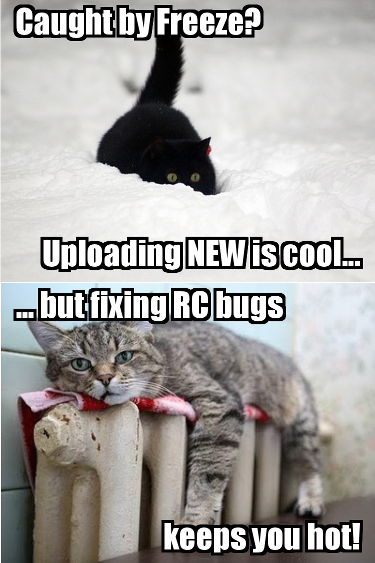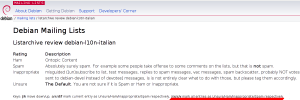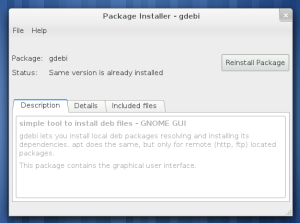
This is an update of
my previous attempt at summarizing this discussion. As I proposed one of the amendments, you should not blindly trust me, of course. :-)
First, let s address two FAQ:
What is the impact on jessie?
On the technical level, none. The current state of jessie already matches what is expected by all proposals. It s a different story on the social level.
Why are we voting now, then?
Ian Jackson, who submitted the original proposal, explained his motivation in
this mail.
We now have four different proposals: (summaries are mine)
- [iwj] Original proposal (Ian Jackson): Packages may not (in general) require one specific init system (Choice 1 on this page)
- [lucas] Amendment A (Lucas Nussbaum): support for alternative init systems is desirable but not mandatory (Choice 2 on this page)
- [dktrkranz] Amendment B (Luca Falavigna): Packages may require a specific init system (Choice 3 on this page)
- [plessy] Amendment C (Charles Plessy): No GR, please: no GR required (Choice 4 on this page)
[plessy] is the simplest, and does not discuss the questions that the other proposals are answering, given it considers that the normal Debian decision-making processes have not been exhausted.
In order to understand the three other proposals, it s useful to break them down into several questions.
Q1: support for the default init system on Linux
A1.1: packages MUST work with the default init system on Linux as PID 1.
(That is the case in both [iwj] and [lucas])
A1.2: packages SHOULD work with the default init system on Linux as PID 1.
With [dktrkranz], it would no longer be required to support the default init system, as maintainers could choose to require another init system than the default, if they consider this a prerequisite for its proper operation; and no patches or other derived works exist in order to support other init systems. That would not be a policy violation. (see
this mail and
its reply for details). Theoretically, it could also create fragmentation among Debian packages requiring different init systems: you would not be able to run pkgA and pkgB at the same time, because they would require different init systems.
Q2: support for alternative init systems as PID 1
A2.1: packages MUST work with one alternative init system (in [iwj])
(Initially, I thought that one here should be understood as sysvinit , as
this mail, Ian detailed why he chose to be unspecific about the target init system. However, in
that mail, he later clarified that a package requiring systemd or uselessd would be fine as well, given that in practice there aren t going to be many packages that would want to couple specifically to systemd _or_ uselessd, but where support for other init systems is hard to provide.)
To the user, that brings the freedom to switch init systems (assuming that the package will not just support two init systems with specific interfaces, but rather a generic interface common to many init systems).
However, it might require the maintainer to do the required work to support additional init systems, possibly without upstream cooperation.
Lack of support is a policy violation (severity >= serious, RC).
Bugs about degraded operation on some init systems follow the normal bug severity rules.
A2.2: packages SHOULD work with alternative init systems as PID 1. (in [lucas])
This is a recommendation. Lack of support is not a policy violation (bug severity < serious, not RC). A2.3: nothing is said about alternative init systems (in [dktrkranz]). Lack of support would likely be a wishlist bug.
Q3: special rule for sysvinit to ease wheezy->jessie upgrades
(this question is implicitly dealt with in [iwj], assuming that one of the supported init systems is sysvinit)
A3.1: continue support for sysvinit (in [lucas])
For the jessie release, all software available in Debian wheezy that supports being run under sysvinit should continue to support sysvinit unless there is no technically feasible way to do so.
A3.2: no requirement to support sysvinit (in [dktrkranz])
Theoretically, this could require two-step upgrades: first reboot with systemd, then upgrade other packages
Q4: non-binding recommendation to maintainers
A4.1: recommend that maintainers accept patches that add or improve
support for alternative init systems. (in both [iwj] and [lucas], with a different wording)
A4.2: say nothing (in [dktrkranz])
Q5: support for init systems with are the default on non-Linux ports
A5.1: non-binding recommendation to add/improve support with a high priority (in [lucas])
A5.2: say nothing (in [iwj] and [dktrkranz])
Comments are closed: please discuss by replying to
that mail.
 I m receiving more requests for upload accounts to the Deb-o-Matic servers lately (yay!), but that means the resources need to be monitored and shared between the build daemons to prevent server lockups.
My servers are running systemd, so I decided to give systemd.resource-control a try. My goal was to assign lower CPU shares to the build processes (debomatic itself, sbuild, and all the related tools), in order to avoid blocking other important system services from being spawned when necessary.
I created a new slice, and set a lower CPU share weight:
I m receiving more requests for upload accounts to the Deb-o-Matic servers lately (yay!), but that means the resources need to be monitored and shared between the build daemons to prevent server lockups.
My servers are running systemd, so I decided to give systemd.resource-control a try. My goal was to assign lower CPU shares to the build processes (debomatic itself, sbuild, and all the related tools), in order to avoid blocking other important system services from being spawned when necessary.
I created a new slice, and set a lower CPU share weight: This is probably because schroot spawns a login shell, and systemd considers it belonging to a different process group. So, I had to launch the command systemctl set-property user.slice CPUShares=512, so all processes belonging to the user.slice will receive the same share of the debomatic ones. I consider this a workaround, I m open to suggestions how to properly solve this issue :)
I ll try to explore more options in the coming days, so I can improve my knowledge of systemd a little bit more :)
This is probably because schroot spawns a login shell, and systemd considers it belonging to a different process group. So, I had to launch the command systemctl set-property user.slice CPUShares=512, so all processes belonging to the user.slice will receive the same share of the debomatic ones. I consider this a workaround, I m open to suggestions how to properly solve this issue :)
I ll try to explore more options in the coming days, so I can improve my knowledge of systemd a little bit more :) This is an update of
This is an update of  Today I ll be telling you about an interesting way to build your Debian packages using Deb-o-Matic, a tool developed and maintained by
Today I ll be telling you about an interesting way to build your Debian packages using Deb-o-Matic, a tool developed and maintained by 




 Jokes off now, time to take it
Jokes off now, time to take it